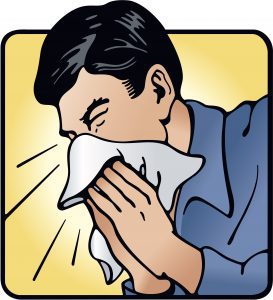Medical Compass: Can you conquer the common cold?
By David Dunaief, M.D.

As the weather has started to turn cooler, I’ve been hearing a lot more sniffling and sneezing. It’s a good reminder that cold season is upon us. Most frequently caused by the human rhinovirus, a cold’s effects can range from an annoyance to more serious symptoms that put us out of commission for a week or more.
The good news is that it may be possible to reduce the symptoms — or even reduce the duration — of a common cold with lifestyle management and a few dietary supplements.
What can you do to relieve cold symptoms?
If you have congestion or coughing symptoms, sitting in a steamy bathroom may help. It simulates a medical mist tent, moisturizing your nasal and bronchial passages. Dry heat is your enemy when you’re experiencing cold symptoms. If your home or office is dry, use a cool mist humidifier to put some humidity back in the air.
Eating salt-free soups loaded with vegetables can help increase your nutrient intake and loosen congestion. I start with a sodium-free soup base and add in spices, onions, spinach, broccoli, and other greens until it’s more stew-like than soup-like. Caffeine-free hot teas will also help loosen congestion and keep you hydrated.
Does Zinc reduce a cold’s duration?
You may have heard that zinc helps treat a cold. I have good news: it does!
According to a meta-analysis that included 13 trials, zinc in any form taken within 24 hours of your first symptoms may reduce the duration of a cold by at least one day (1). Even more importantly, zinc may significantly reduce the severity of your symptoms throughout, improving your quality of life. This may be due to an anti-inflammatory effect.
 One of the studies, published in the Journal of Infectious Disease, found that zinc reduced the duration of the common cold by almost 50 percent from seven days to four days, cough symptoms were reduced by greater than 60 percent, and nasal discharge was reduced by 33 percent (2). Researchers used 13 grams of zinc acetate per lozenge taken three-to-four times daily for four days. This translates into 50-65 mg per day.
One of the studies, published in the Journal of Infectious Disease, found that zinc reduced the duration of the common cold by almost 50 percent from seven days to four days, cough symptoms were reduced by greater than 60 percent, and nasal discharge was reduced by 33 percent (2). Researchers used 13 grams of zinc acetate per lozenge taken three-to-four times daily for four days. This translates into 50-65 mg per day.
Be aware, however, that there are a few serious concerns with zinc. First, the dose researchers used was well above the maximum intake recommended by the National Institutes of Health, which is 40 mg per day for adults. This maximum intake number is less for those 18 and younger (3). Also, the FDA has warned against nasal zinc administration with sprays, which has led to permanent loss of smell for some people.
Not all studies showed a benefit. Also, studies where there was a proven benefit may have used different formulations, delivery systems and dosages, and there is no current recommendation or consensus on what is optimal.
Does vitamin C help cure a cold?
According to a review of 29 trials with a combined population of over 11,000, vitamin C did not show any significant benefit in preventing or reducing cold symptoms or duration in the general population (4). With this in mind, there may be no reason to take mega-doses of vitamin C for cold prevention and treatment. However, in a sub-group of serious marathon runners and other athletes, there was substantial risk reduction when taking vitamin C prophylactically; they caught 50 percent fewer colds.
Is echinacea a possible cure?
After review of 24 controlled clinical trials, the Cochrane Database notes that the jury is still out on the effectiveness of echinacea for treatment of duration and symptoms, but the results are disappointing and inconsistent (5). There are no valid randomized clinical trials showing cold prevention using echinacea.
In a randomized controlled trial with 719 patients, echinacea was no better than placebo for the treatment of the common cold (6).
Should you exercise or not?
People with colds need rest — at least that was the theory. However, a study published in the British Journal of Sports Medicine may change this perception. Participants who did aerobic exercise at least five days per week, versus one or fewer days per week, had a 43 percent reduction in the number of days with colds over two 12-week periods during the fall and winter months (7). Even more interesting is that those who reported themselves as being highly fit had a 46 percent reduction in the number of days with colds compared to those who perceived themselves to have low fitness. Their cold symptoms were reduced significantly as well.
What are our takeaways?
For symptom relief, simple home remedies may actually work better than supplements. Zinc might be useful in treating and preventing the common cold. Use caution with dosing, however, to reduce its side effects. Echinacea and vitamin C have not been proven to provide benefits, but don’t stop taking them if you feel they help you. Lastly, exercise might actually reduce your cold’s duration.
References:
(1) Open Respir Med J. 2011; 5: 51–58. (2) J Infect Dis. 2008 Mar 15;197(6):795-802. (3) ods.od.nih.gov. (4) Cochrane Database of Systematic Reviews 2013, Issue 1. Art. No.: CD000980. (5) Cochrane Database of Systematic Reviews 2014, Issue 2. Art. No.: CD000530. (6) Ann Intern Med. 2010;153(12):769-777. (7) British Journal of Sports Medicine 2011;45:987-992.
Dr. David Dunaief is a speaker, author and local lifestyle medicine physician focusing on the integration of medicine, nutrition, fitness and stress management. For further information, visit www.medicalcompassmd.com or consult your personal physician.







